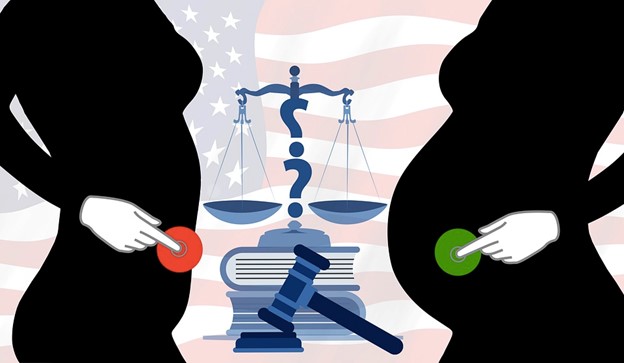According to a BBC news article titled Roe v. Wade: What is US Supreme Court ruling on abortion?, Roe v. Wade was a landmark court case passed by the United States Supreme Court in the l900s, which protected a woman’s right to terminate her pregnancy, otherwise known as abortion. The court case was primarily centered around Norma McCorvey (who used the pseudonym “Jane Roe”) who challenged the abortion laws in her home state (Texas) in 1969, claiming that she had the right to abortion, and that she had been raped. Unfortunately, the case was rejected, and she was forced to give birth. Later, in 1975, a woman in Georgia, Sandra Bensing, appealed to the court with a similar case. Soon, the case made its way to the Supreme Court, where the Court voted in favor of Bensing and McCorvey, stating that the right to terminate their pregnancy was protected under the Constitution.
On Friday, June 24, 2022, the Supreme Court voted to overturn the case. Twenty-six states are estimated to either certainly ban abortion, or be extremely likely to ban abortion. This article will breifly explore the effect of restricting abortion on women’s health.
Amy Roeder, part of Harvard University’s T.H. Chan School of Public health, details the scope of this issue in an article. “According to the World Health Organization, 23,000 women die from unsafe abortions each year and tens of thousands more experience significant health complications globally,” says Roeder. “A recent study estimated that banning abortion in the U.S. would lead to a 21% increase in the number of pregnancy-related deaths overall and a 33% increase among Black women, simply because staying pregnant is more dangerous than having an abortion. Increased deaths due to unsafe abortions or attempted abortions would be in addition to these estimates” (Roeder, 2021).
In coming years, women who wish to terminate their pregnancy may seek unsafe ways to abort the baby. This could result in severe detriments to their physical health as well as a high risk of death.
On the other hand, women could also choose to travel to a state that is not affected by the reversal of Roe. However, Furthermore, this would have a disproportionate effect on women of color and women living in low-income communities as they are inherently financially disadvantaged and may not be able to make the journey.
Another concern caused by the reversal of Roe vs. Wade is the inability to treat certain medical cases. An example of this is an ectopic pregnancy. According to the New York Times, “… an ectopic pregnancy occurs when a fertilized egg implants in the wrong place in a woman’s body. So instead of attaching to the lining of the uterus, where it can survive, it grows elsewhere” (New York Times, n.d). She must undergo surgery to remove the fetus from her body. Typically, during an ectopic pregnancy, an embryo implants itself in a woman’s fallopian tubes, which are thin and filled with blood vessels. As the embryo develops, the fallopian tubes are at risk to rupture, causing internal bleeding.
If a woman experiences an ectopic pregnancy, she cannot birth the child. She must have it removed via surgery. However, after the recent reversal of Roe v. Wade, many doctors or gynecologists are hesitant to treat ectopic pregnancies as it is unclear as to whether they classify as an abortion or not. If women who experience an ectopic pregnancy are unable to receive care, the risk of death or developing severe health-related issues is extremely high.
In all, the reversal of Roe v. Wade has an enormous effect on women’s health, indirectly or not.
For support, please visit:
https://www.wired.com/story/guide-abortion-resources-post-roe-america/
References
BBC. (2022, June 24). Roe v Wade: What is US Supreme Court ruling on abortion? BBC News. Retrieved June 29, 2022, from https://www.bbc.com/news/world-us-canada-54513499
Pearson, C. (2022, June 28). What is ectopic pregnancy? The New York Times. Retrieved June 29, 2022, from https://www.nytimes.com/article/ectopic-pregnancy-symptoms-treatment.html
Roeder, A. (2021, December 13). The negative health implications of restricting abortion access. News. Retrieved June 29, 2022, from https://www.hsph.harvard.edu/news/features/abortion-restrictions-health-implications/
